by Steve Selden | Jul 31, 2018 | Churchill News
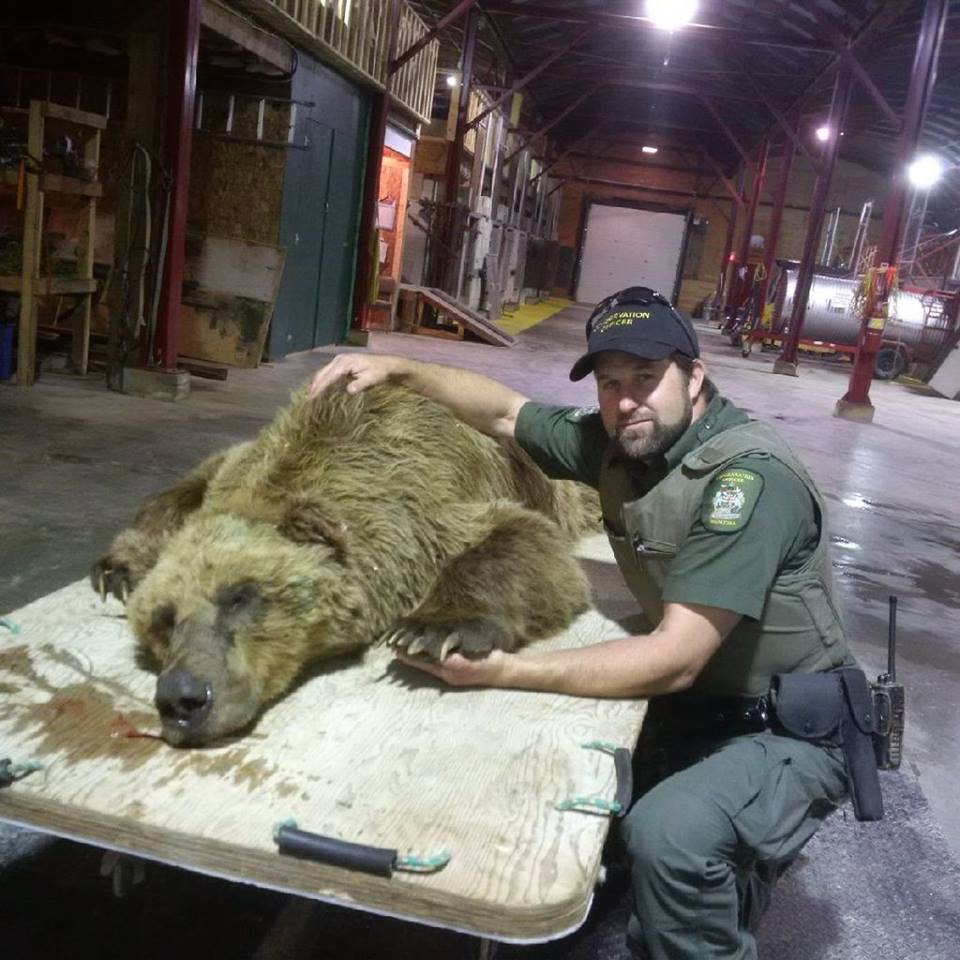
Barren – ground grizzly under sedation at the Churchill Polar Bear Holding Facility. Manitoba Conservation photo.
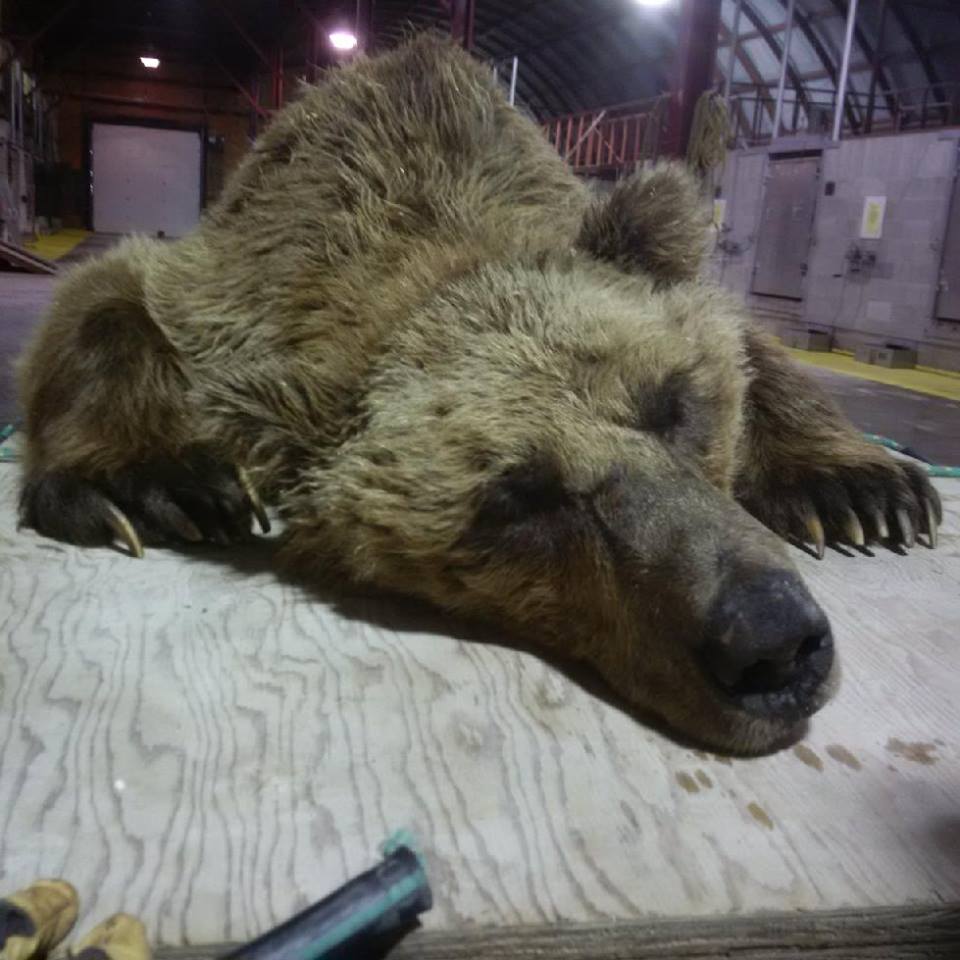
Barren – ground grizzly in the Churchill Polar Bear Holding Facility. Manitoba Conservation photo.
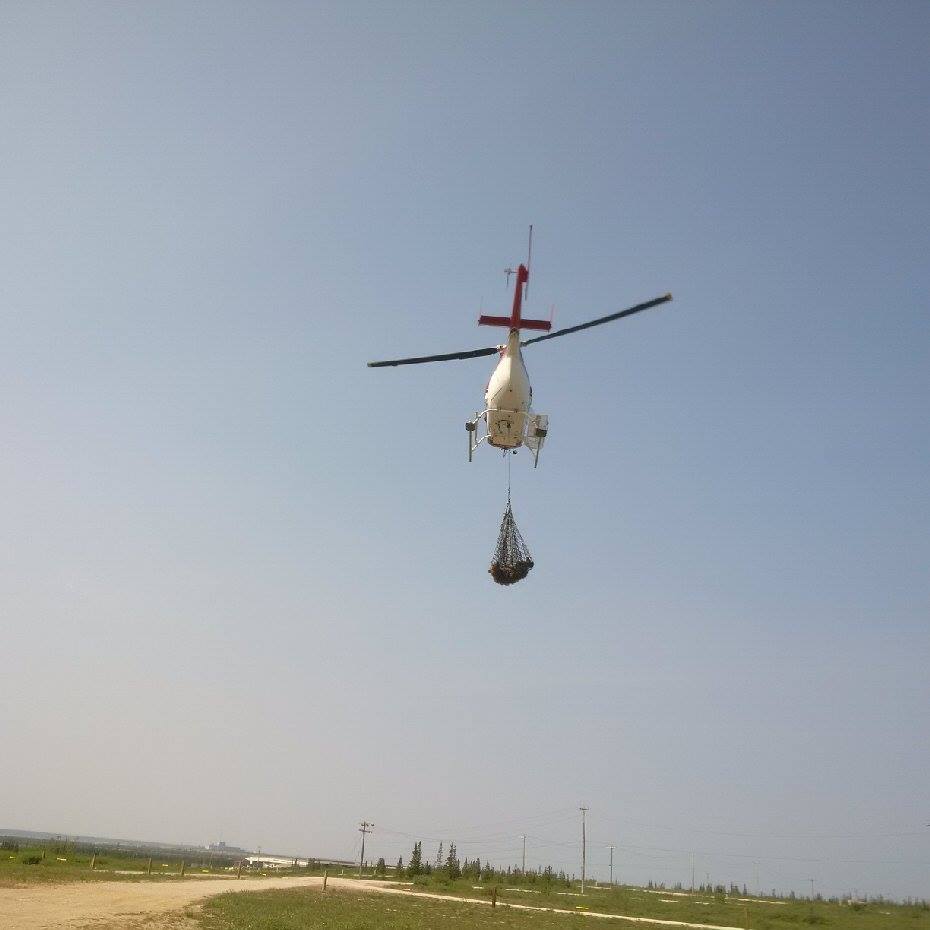
Helicopter lifts the Barren – ground grizzly to its northern release location. Manitoba Conservation photo.
In Churchill, when a bear breaks into a cabin or outbuilding, Polar Bear Alert is called. On July 18, 2018 the call was made and Conservation officers investigated. No bear was located that day however roughly a week later a bear was captured in a culvert trap set by the officers in the area.
July 26th Manitoba Conservation officers approached a trap and realized quickly they had a bear inside. Once they examined the trap more closely they were quite surprised. Instead of the usual polar bear captive, they had trapped a Barren – ground grizzly bear! After spending part of the day in the polar bear holding facility, the animal was airlifted and released near the Manitoba – Nunavut border to the north.
The male grizzly weighed 388 lbs and was equipped with a GPS ear tag and lip tattooed to track its movements. The GPS will transmit over the next four months and researchers will be able to study its migration pattern. Barren – ground grizzlies are Protected under the Endangered Species and Ecosystems Act.
by Steve Selden | Jul 23, 2018 | Churchill News
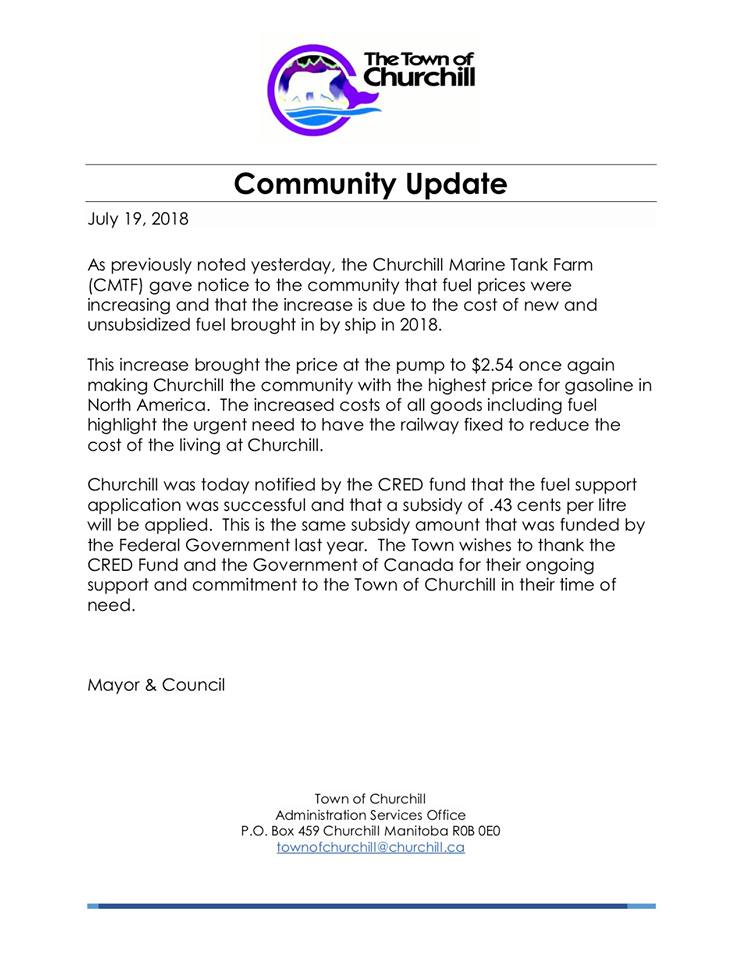
Some relief is here for Churchillians as the Government of Canada has approved a .43 cent per liter subsidy for fuel supplied by the Churchill Marine Tank Farm. Although there is some resentment still towards Omnitrax, the current owner of the tank farm, residents feel fortunate to have the discounted fuel. Churchill currently has the highest price per lite/gallon of fuel in North America!
by Steve Selden | Jul 20, 2018 | Churchill News
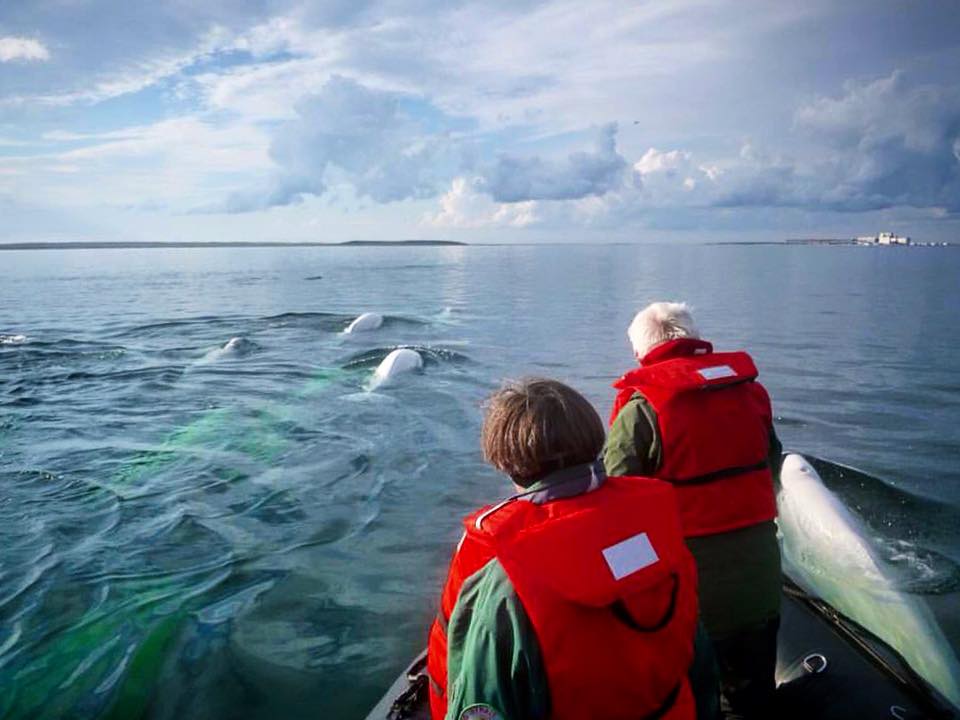
Beluga whales at the bow in Churchill on the water. Sea North Tours photo.
When it rains it pours on the battered town of Churchill. Prime beluga whale watching season in Churchill has brought new threats from the Department of Fisheries and Oceans (DFO) to enforce federal rules restricting tour boats and kayakers to remain 100meters from the animals. This on top of the ongoing saga of the non-operational Hudson Bay rail line have spirits in the northern outpost at an all-time low. Throw in soaring prices for groceries and fuel over $2.50 per litre and the outlook for the near future is grim.
Whale watch tour companies in Churchill fear the new regulations and the absence, at least for the foreseeable future, could place stress on their livelihoods and in the worst case scenario, force them to shut down. Fuel costs as well have raised overhead already.
Each Summer, more than 60,000 beluga whales and their young migrate to the southern Hudson Bay coastal waters and infiltrate the freshwater estuaries like the Seal and Churchill Rivers. These accessible pods of mystical beings are easily approachable via zodiacs and larger observation vessels.
With travelers coming from near and far to get a close up look at these marine mammals, business is built on the summer numbers being high. No train and no close-up viewing will hit these small operators hard.
DFO has attached fines of $50,000 to $500,000 dollars for breaking the rules which with one ticket alone could literally mean the end of the road.
The only light at the end of the tunnel or on the horizon is the loophole in the wording of the mandate. It states that boats cannot pursue whales though whales can come to the boats without penalty or risk of fines. In my 10 years experience on the Churchill waters, this happens 90% of the time. DFO is worried mainly about boats approaching whales at a quick pace or feeding sessions as well as nursing calves. However, belugas move at their own pace and tend to keep their distance from and boats while engaged in these activities.
“As soon as we take our boats out on to the water we are literally flogged by whales, we would actually have to drive away from them to make these amendments applicable,” said Wally Daudrich, who is with the Churchill Beluga Whale Tour Operator Association.
DFO is confident that these restrictions, that most likely will be loosely enforced due to the remoteness of Churchill, are not intended to harm businesses.
“We’ve established these distances based on the best available science around what distance would lead to the lead to the whale being disturbed,” said Adam Burns, who works in fisheries resource management at Fisheries and Oceans Canada.
Oceans North marine biologist Kristin Westday maintains that Churchill’s whales are thriving, stating that eastern Canada and the west coast have struggling populations. She states that there is no evidence the tours are harming the belugas.
“Let’s prepare for the future. So should there be oil and gas that’s something we need to step in front of. Let’s enforce those rules, no oil and gas,” said Westdal.
by Steve Selden | Jun 26, 2018 | Churchill News
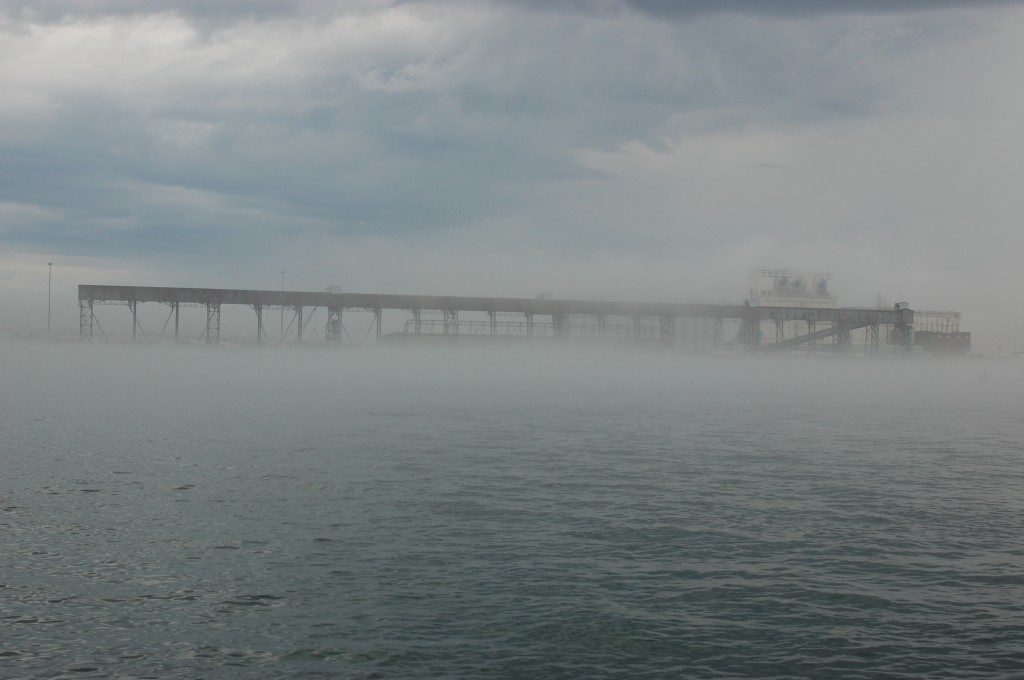
Future of the Port of Churchill is a bit foggy. Photo Steve Selden
The Canadian federal transportation regulator ruled last week that Omnitrax Canada is responsible for long-overdue repairs to the Hudson Bay Rail line linking Churchill with the south. The order mandates the tracks restored to usable condition, as quickly as possible.
This new development in the ongoing saga between Port of Churchill owners, Omnitrax, and the government seems to be coming to a crescendo of sorts. Repairs to the Hudson Bay Railroad have been ordered to begin by July 3rd with the additional requirement of filing monthly progress reports on the status of repairs. The Canadian Transportation Agency will be overseeing the project.
According to the transportation regulator, Omnitrax, as the current owner, is bound by a public obligation to restore the tracks and reinstate train service to the isolated communities and the “reasonable pause” in operations has elapsed. The tracks were washed out in May of 2017 due to flooding from two late spring blizzards.
The Canadian Transportation Agency maintains that the Denver-based company was contractually bound to initiate a reasonable plan to repair the tracks the by November 2017. Omnitrax hired an engineering company, AECOM, to assess the damage and then balked at the estimated $60 million estimate of repair costs. Company officials assert the transportation lifeline to the north should be treated as a public utility since commercial ownership of the railway line is no longer viable. The government has been insinuating that Omnitrax is trying to shirk its responsibilities since the time of the flooding.
Omnitrax’s argument continues with the premise that the flood was a “force majeure” event defined as an exceptional happening that nixes the firm’s contractual obligations.
by Steve Selden | Jun 4, 2018 | Churchill News

The Port of Churchill still vacant while the sale of the business is in limbo. Katie de Meulles photo.
There are no groundhogs in Churchill! So, there really cannot be a “groundhog” day. However, with the recent announcement of the Port of Churchill and the Hudson Bay Line being sold again there seems to be some confusion.
There apparently is another informal agreement that will reestablish ownership of the Hudson Bay Rail line and the Port of Churchill within the northern Manitoba community and keep the facilities under Canadian control.
One North and Missinippi Rail LP have joined forces with Fairfax Financial Holdings and come to an informal agreement to acquire the dormant assets from current owner Denver, Colorado-based Omnitrax.
Fairfax, a Toronto-based investment company, agreed to partner with One North and Missinippi Rail this past November, to purchase Omnitrax’s northern Manitoba assets.
The arrangement includes the participation of 41 First Nations and non-First Nation communities in northern Manitoba as well as seven Kivalliq communities in western Nunavut, along with Fairfax and AGT, the government said.
Omnitrax owner Pat Broe and Fairfax president Paul Rivett negotiated the acquisition, but there are multiple legal issues to finalize before prior to a finalized deal can be completed.
Churchill mayor and One North co-chair Mike Spence has been waiting a long time for this deal to materialize. Spence has been tirelessly lobbying for a deal since Omnitrax began reducing the frequency of rail service to Churchill nearly two years ago.
However, as we all have seen, this deal will not be official until papers have been signed and money exchanges hands. We have seen far too many deals or rumors of deals taken away with the tide of the Hudson Bay.
“Priority No. 1 will be rail line repairs in the very near future and to finalize the acquisition,” Spence wrote in a statement.
“This is a historic partnership involving Indigenous and northern communities with industry leaders that now positions the Port of Churchill as an Arctic gateway for future prosperity.”
The Hudson Bay rail line to Churchill was washed out by a flood runoff from two late spring blizzards in May 2017. Since then, Omnitrax has refused to repair the tracks and has been in an ongoing battle with the Canadian Government over responsibilities regarding the repairs. Initially, the costs of repairs were between $40 and $60 million. Omnitrax claimed it was unable to cover those high costs.
Canada Prime Minister Justin Trudeau stated last year that Omnitrax is responsible for getting the train line up and running again. While this is being settled, at this point most likely through new ownership, the federal government has been providing ongoing subsidies to northern residents to help defray escalating costs of goods shipped north.
by Steve Selden | May 23, 2018 | Churchill News

Train engine being hoisted onto the cargo ship at the Churchill Port. Katie de Meulles photo.
The Port of Churchill is minus one prospective suitor for possible acquisition. The group, iChurchill and a First Nations consortium led by Glenn Hudson, Peguis First Nations Chief has withdrawn from bidding on the Port and the Hudson Bay Line.
“We are disappointed to have put so much time, effort and money into what would have been a timely solution for the people of Churchill and the economy of Western Canada, but we have apparently run up against politics,” said Louis Dufresne , CEO of iChurchill,
“We finally met last week with the government of Canada’s negotiator on the file, Mr. Wayne Wouters, and he made it clear that the government is willing to deal only with one specific company, a Toronto-based financial firm. We can’t understand why this is, given that our partnership meets all of the government’s stated criteria to support the restoration of rail service to Churchill.”
Churchill’s mayor Mike Spence and town council said iChurchill had previously announced that they were still negotiating with Omnitrax and the Canadian government to try and reach an agreement on the sale.
Now, iChurchill states that the federal government is catering to one exclusive buyer and will only offer financial assistance for track repairs to the Hudson Bay Railway for that group exclusively. Trains have not run to Churchill since last May and it appears that the hopes of starting the repairs this summer are fading again.
“Our team believes that these assets can be operated profitably,” said Dufresne. “My head cares about the commercial interests. But my heart is with the people of Churchill and the First Nations of Northern Manitoba. It’s been a year since a flood washed out their only land link to the rest of the country. I hope they can get their railway back online this year, but without a change in position on the part of the federal government, I’m not optimistic.”
We will have to wait and see what other potential buyers and investors arise in the near future.









